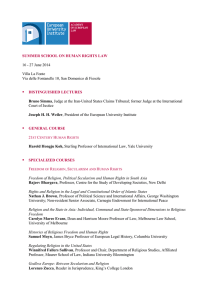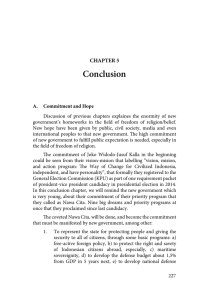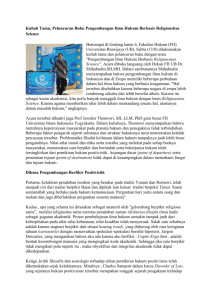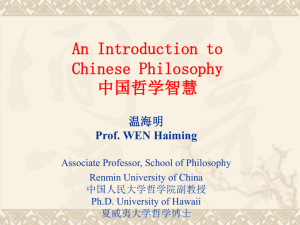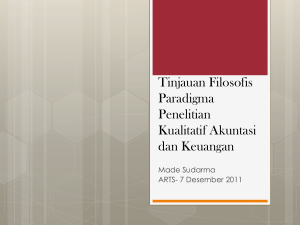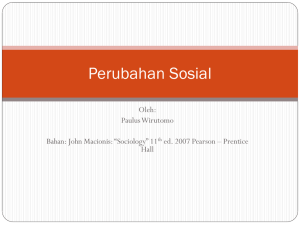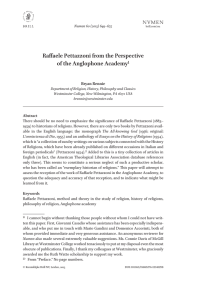Document 12692711
advertisement
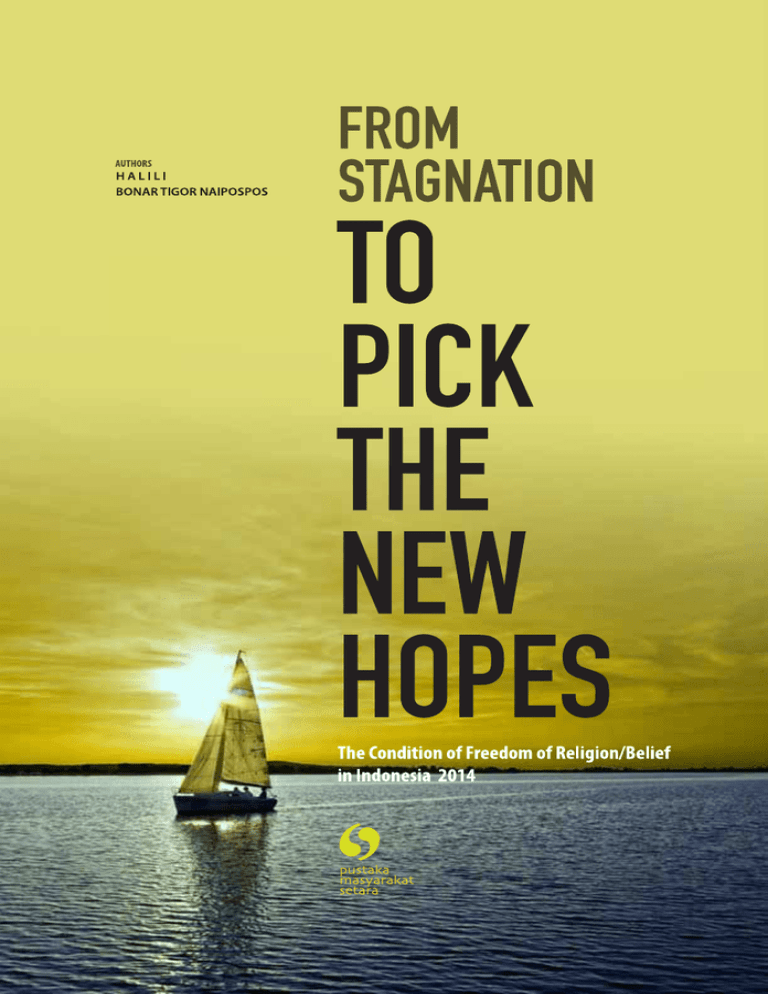
FROM STAGNATION TO PICK THE NEW HOPES The Condition of Freedom of Religion/Belief in Indonesia 2014 Jakarta, February 2015 x + 255 pages 230 mm x 155 mm ISBN : 978-6021-8668-8-7 Halili Bonar Tigor Naipospos TRANSLATOR Juwarti Hafsah EDITORS Ismail Hasani Suryadi A. Radjab RESEARCHER TEAM Achmad ‘Awe’ Fanani Rosyidi (Jakarta) Aminudin Syarif (Jakarta) Bahrun (West Nusa Tenggara) Destika Gilang Lestari (Aceh) Dewi Anggraini (East Kalimantan) Dindin Abdullah G (West Java) Fitra Octora (Bali) Halili (Yogyakarta) Hilaludin (Jakarta) Jefrianto (Central Sulawesi) Kahar Muamalsyah (Central Java) Marthen Salu (East Nusa Tenggara) Maysarroh (Riau) Mohamad (West Kalimantan) Muhrizal Syahputra (North Sumatera) Nasrum (South Sulawesi) Nurhasanah (North Sulawesi) Rokhmond Onasis (Central Kalimantan) Roni Saputra (West Sumatera) Rudi Sukirno (East Java) Siti Khoiriyaningsih (Yogyakarta) Yahya Mahmud (North Maluku) LAYOUT Titikoma-Jakarta AUTHORS PUBLISHED BY Pustaka Masyarakat Setara Jl. Danau Gelinggang No. 62 Blok C-III Bendungan Hilir, Indonesia 10210 Tel: +6285100255123 (upgrade) Fax: +6221-5731462 setara@setara-institute.org setara_institute@hotmail.com Foreword 1945 Indonesian Constitution has been giving the constitutional guarantee to all citizens to embrace religion or belief, and to worship in accordance to that current religion or belief. Some of policy products and its derivative also state the guarantee like stipulated in Constitution. The Act No. 12/2005 about Ratification of Civil and Politic Covenant, which one of its clause containing the guarantee on freedom of religion/ belief has become the anvil that international law products has been being the part of Indonesian law which binding the state to guaranteeing and to fulfilling it. However, the legal and constitutional guarantee which available in Indonesia constitution, is not quiet able to protect that basic freedom. Some violations against freedom are precisely triggered by the state that continues to product restrictive constitution against citizens who embrace religion/belief that considered different to the mainstream one. Likewise, the lack of public knowledge on citizen’s civil freedom, which is then trigger intolerance and criminal action against another citizen. These both problems that become serious challenge on civil freedom guarantee fulfillment, particularly the freedom of religion/ belief in Indonesia. As an organization which aims to create equal society, SETARA Institute pays serious attention to the latest conditions that relating to unequal treatment that experienced by citizen and some religious adherents/belief holder in Indonesia. This annual report is an action iii THE CONDITION OF FREEDOM OF RELIGION/BELIEF IN INDONESIA 2014 form of SETARA Institute to inform and to promote the public about the latest and regular conditions of Freedom of Religion/Belief in Indonesia. The annual report of 2014 is the eighth report which published by SETARA Institute, which is the result of monitoring about condition on freedom of religion/belief. This publication is being expected to be a concern of many parties, especially the state, which in the human rights perspective is having obligation to respect, to promote, and to fulfill human rights. Monitoring and publication of this annual report aims to [1] to documenting and to publishing the violation facts and breakthrough/ progress on freedom of religion/belief in Indonesia; [2] to encourage the country to fulfilling guarantee on freedom of religion/belief including to perform some legislation products that confines freedom of religion/ belief and victims’ right recovery; and [3] to strengthen the civil society network and to expand the constituent to push them to encourage guarantee of freedom of religion/belief. This monitoring uses citizens’ constitutional rights parameter that guaranteed by the Constitution and human right parameter, especially the International Covenant about Politics and Civil Rights which has been ratified by the Act. No. 12/ 2005. Another parameter that is used also is the Declaration of Elimination of All Forms of Intolerance and Discrimination Based on Religion or Belief which was initiated through the Resolution of United Nation General Assembly No. 36/55 on 25 November 1981. In the eighth year SETARA Institute conduct monitoring, freedom of religion / belief find a hope for progress after stagnating and even a setback in the previous seven years. Even we realized that the hope of refinement is still being an idea, and the politic platform of the new leadership for Joko Widodo-Jusuf Kalla’s regime, but from that national leadership willingness aspect, it precisely initiates that new hope emerged. Finally, SETARA Institute hopes this Annual Report can be useful iv F R O M S TA G N AT I O N TO P I C K T H E N E W H O P E S for all, especially for policy makers, to rush to make improvements which guarantee the freedom of religion/belief in Indonesia. To all, who support the work of the monitoring and publication of this report, I thank you. Jakarta, 22 January 2015 HENDARDI The Chairman of Executive Board of SETARA Institute v THE CONDITION OF FREEDOM OF RELIGION/BELIEF IN INDONESIA 2014 vi Table of Contents Foreword .............................................................................................. iii Table of Contents..................................................................................vii CHAPTER 1 Introduction............................................................................................1 A.Background....................................................................................................... 1 B. Research Methodology.........................................................................11 C. Theoretical Study and Conceptual Framework.................................12 CHAPTER 2 Condition of Freedom of Religion/Belief 2014...................................27 A.Introduction ..........................................................................................27 B. The Findings of The Violations Monitoring on Freedom of Religion/Belief ......................................................................................28 C. Some of Prominent Cases in 2014.....................................................40 1. Case of Jakarta: Discrimination on Ahok and FPI Dissolation Dilemma................................................................................................... 40 2. Case of Yogyakarta: Assault and Dissolution of Worship in Tolerance City.......................................................................................... 52 CHAPTER 3 The Baseline on Freedom of Religion/Belief.......................................67 A.Introduction ..........................................................................................67 B. The 8 Years of Freedom of Religion and Belief: From “Subject to the Mass Judgement” to “Stagnation on Freedom of Religion”....... 68 vii THE CONDITION OF FREEDOM OF RELIGION/BELIEF IN INDONESIA 2014 C. The Map of Condition and Guarantee of Freedom of Relgion/ Belief in Monitoring Regions...............................................................80 1. Red Zone................................................................................ 81 a. West Java: The Acute Intolerance ..........................................81 b. Aceh: Constitutional Disintegration .....................................86 c. East Java: The Government Subject To the Islamic Priest.... 89 d. DKI Jakarta: Open Space for Intolerant Groups..................93 e. West Nusa Tenggara: The Long-Drawn Omission..............97 f. South Sulawesi: The Strong Misdirection, Weak Government ...........................................................................101 g. West Sumatera: Strengthening Belief Radicalization .......108 h. North Sumatera: The Aversion of Local Government To Solve The Case of House of Worship ..................................115 2. The Orange Zone................................................................. 120 a. DI Yogyakarta: The Tolerance Susceptibility......................120 b. Central Java: Tolerance vs Intolerance in Feudalism Arena ....125 c. Central Sulawesi: KBB in the Religious Conflict Vortex...133 d. Bali: Between the Issue of Jilbab Prohibition and the Difficulty of Establish House of Worship............................138 e. East Kalimantan: The Majority Temptation in Ethnic and Religious Pluralism................................................................147 f. Riau: Misdirection on Ahmadiyah and Syi’ah in Malay Land.........................................................................................152 3. Yellow Zone......................................................................... 156 a. North Sulawesi: The Tilapia in the middle of Christiant Majority...................................................................................156 b. North Maluku: Little Obstacle of Intolerance for Syi’ah Congregation..........................................................................162 c. West Kalimantan: KBB in Social Conflict Vortex..............166 d. Central Kalimantan: About Kaharingan and Social Conflict Management Challenge.........................................172 e. East Nusa Tenggara: the Tolerance in Flobamora Land...176 viii F R O M S TA G N AT I O N TO P I C K T H E N E W H O P E S CHAPTER 4 The Big Home Works of State and The New Hope............................193 A.Introduction.........................................................................................193 B. The Restoration of Constitutional Idea about Freedom of Religion ...........................................................................................194 C. To Unrave the Complexity of House of Worship Establishment.... 201 D. Stopping the Belief Criminalization.................................................211 E. Presenting the State in facing Intolerance Actors...........................216 CHAPTER 5 Conclusion..........................................................................................227 A. Commitment and Hope.....................................................................227 B. The Agendas of New Government....................................................232 Bibliography........................................................................................236 Profile of Setara Institute for Democracy and Peace........................246 Writers’ Curriculum Vitae.................................................................253 ix THE CONDITION OF FREEDOM OF RELIGION/BELIEF IN INDONESIA 2014 x
